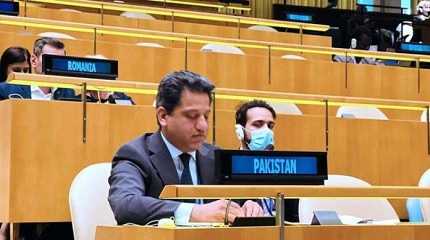
UNITED NATIONS, Nov 03 (APP): Reaffirming its commitment to the Global Compact on Refugees, which calls for greater support for refugees and the countries that welcome them, Pakistan told a UN panel Wednesday about its “unparalleled” hospitality in hosting Afghan refugees for four decades while adhering to the highest standards of protection, which continued during the pandemic.
“The prevailing complex and multifold challenges demand more robust and collective efforts to meet the growing protection needs and to forge durable solutions,” Ambassador Aamir Khan, deputy permanent representative of Pakistan to the UN, aid in his remarks to the General Assembly’s Third Committee, which deals with social, humanitarian and cultural matters.
The Pakistani envoy was commenting on the report presented to the committee by Filippo Grandi, United Nations High Commissioner for Refugees (UNHCR), who said that currently there were 104 million displaced people in the world, and pointed out that the Russian invasion of Ukraine led to one of the fastest refugee crises since the Second World War, displacing 14 million people.
On its part, Aamir Khan said Pakistan, despite its economic and social pressures, hosts more than 1.4 million registered Afghan refugees and 850,000 Afghan Citizen Card holders, who he said have free enrollment in government primary schools and access to higher education with generous scholarships, along with bank accounts and numerous livelihood opportunities.
Pakistan, he said, has also supported complex humanitarian efforts in Afghanistan, facilitating evacuations as well as providing food and other supplies.
“We value UNHCR efforts to broaden the support base for refugees and reach out to new partner states and institutions,” the Pakistani envoy said, hoping that it would result in tangible growth in humanitarian funding.
He also said that the UNHCR should be sensitive to the local requirements of refugee-hosting countries and ensure the implementation of its policies is consistent with the local environment.
Briefing the Committee, Grandi, the high commissioner, said, “while climate, the lasting effects of COVID-19, and the cost-of-living crisis all have grave consequences, the inability of the international community to prevent or resolve conflict continues to be the biggest driver of displacement.
Addressing climate-induced displacement, he pointed to floods in Pakistan, a country that already hosts many Afghan refugees, as well as other affected regions, including the horn of Africa, Latin America, South-East Asia, and the Middle East.
Turning to his agency’s budget, he said that it normally receives $5 billion from bilateral and multilateral donors, but this must rise, as the war in Ukraine has increased its spending by more than $1 billion and current funding is lacking by $700 million.




